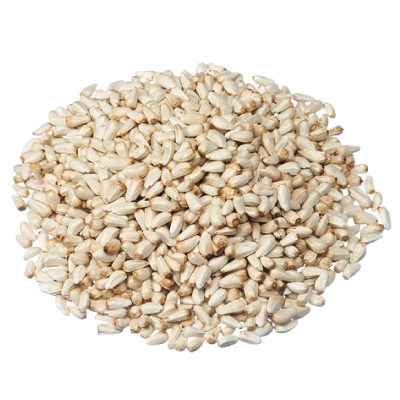Safflower seeds are 6–10 mm in length and resemble those of the sunflower, but with a thicker hull. The yield is 1000–2500 seeds per plant. Earlier varieties had a hull content of some 70%; in recent varieties, this has been reduced to 45%. The shell content of the seeds varies between 30 and 60%, and the oil content of the seeds varies between 20 and 40%. Safflower seeds are a rich source of nutrition, providing a variety of essential vitamins, minerals, and healthy fats. They are a good source of protein, fiber, and iron. Safflower seeds are also a good source of polyunsaturated fatty acids, which are beneficial for heart health.

Safflower seeds are the small, tear-shaped seeds harvested from the safflower plant (Carthamus tinctorius), a member of the sunflower family. These seeds are highly versatile and prized for their various applications in both culinary and industrial fields. They are characterized by their light, ivory-white color and subtle nutty flavor.
1. Cooking Oil: Safflower seeds are primarily processed to extract safflower oil, which is a popular cooking oil known for its high smoke point and neutral flavor profile. It's commonly used in stir-fries, deep-frying, and salad dressings.
2. Snacking: Roasted safflower seeds make for a nutritious and crunchy snack. They can be seasoned with salt or spices for added flavor.
3. Baking: Safflower seeds can be incorporated into baked goods such as bread, muffins, and cookies to add texture and a mild nutty taste.
4. Garnish: These seeds can be sprinkled over salads, soups, or yogurt bowls to add a crunchy element and a touch of flavor.
1. Heart Health: Safflower seeds contain high levels of monounsaturated fats, which may help reduce LDL (bad) cholesterol levels, thereby promoting heart health.
2. Antioxidants: They are a rich source of antioxidants, including vitamin E, which helps neutralize free radicals in the body and may reduce the risk of chronic diseases.
3. Weight Management: Safflower seeds are relatively low in calories and high in dietary fiber, making them a satisfying snack choice that can aid in weight management by promoting feelings of fullness.
4. Skin Health: The presence of vitamin E in safflower seeds contributes to skin health by moisturizing and protecting the skin from oxidative damage.
1. Dyes: Historically, safflower seeds have been used to produce natural dyes for textiles and cosmetics, owing to their vibrant hues ranging from yellow to red.
2. Animal Feed: Safflower seeds are a valuable component of animal feed due to their high protein content and balanced amino acid profile.
3. Biofuel: Safflower oil extracted from the seeds can be converted into biodiesel, serving as a renewable and eco-friendly alternative to conventional fossil fuels.
Overall, safflower seeds are a versatile ingredient with a wide range of culinary, nutritional, and industrial applications, making them a valuable commodity in various industries worldwide.
